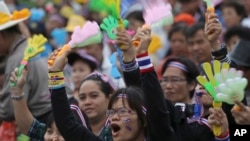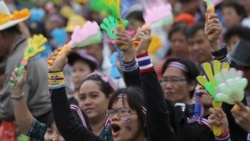Political tension is rising in Thailand, as thousands of anti-government protestors have taken to the streets in recent days and government supporters organize demonstrations of their own. The street rallies escalated as anti-government protestors marched on several government ministries, media outlets and police buildings. So far, while boisterous, all rallies have been peaceful.
The United States is concerned about the protests and is following the situation closely. We urge all sides to refrain from violence, exercise restraint and respect the rule of law.
Protests erupted earlier this month when the government of Prime Minister Yingluck Shinawatra introduced legislation in parliament to grant a blanket amnesty for everyone involved in Thailand’s political conflicts of recent years. The bill was defeated in the Thai Senate amid charges that it was primarily aimed at dismissing corruption charges against the prime minister’s brother, Thaksin Shinawatra, who fled the country to avoid a jail term. Tensions rose further when the government proposed changing the Senate’s makeup to an all-elected body and the measure was struck down by the country’s Constitutional Court.
Clashes between Thailand’s two major political blocs resulted in a State of Emergency in 2008. Protestors briefly seized Bangkok’s international airport, interrupting trade and seriously hurting tourism.
We call on all sides to uphold international norms that guarantee freedom of the press and the safety of journalists. The United States firmly believes all parties should work together to resolve differences through peaceful dialogue in ways that strengthen democracy and rule of law.
As long-time friends of Thailand, we strongly support the Thai nation and its people during this period.
The United States is concerned about the protests and is following the situation closely. We urge all sides to refrain from violence, exercise restraint and respect the rule of law.
Protests erupted earlier this month when the government of Prime Minister Yingluck Shinawatra introduced legislation in parliament to grant a blanket amnesty for everyone involved in Thailand’s political conflicts of recent years. The bill was defeated in the Thai Senate amid charges that it was primarily aimed at dismissing corruption charges against the prime minister’s brother, Thaksin Shinawatra, who fled the country to avoid a jail term. Tensions rose further when the government proposed changing the Senate’s makeup to an all-elected body and the measure was struck down by the country’s Constitutional Court.
Clashes between Thailand’s two major political blocs resulted in a State of Emergency in 2008. Protestors briefly seized Bangkok’s international airport, interrupting trade and seriously hurting tourism.
We call on all sides to uphold international norms that guarantee freedom of the press and the safety of journalists. The United States firmly believes all parties should work together to resolve differences through peaceful dialogue in ways that strengthen democracy and rule of law.
As long-time friends of Thailand, we strongly support the Thai nation and its people during this period.






